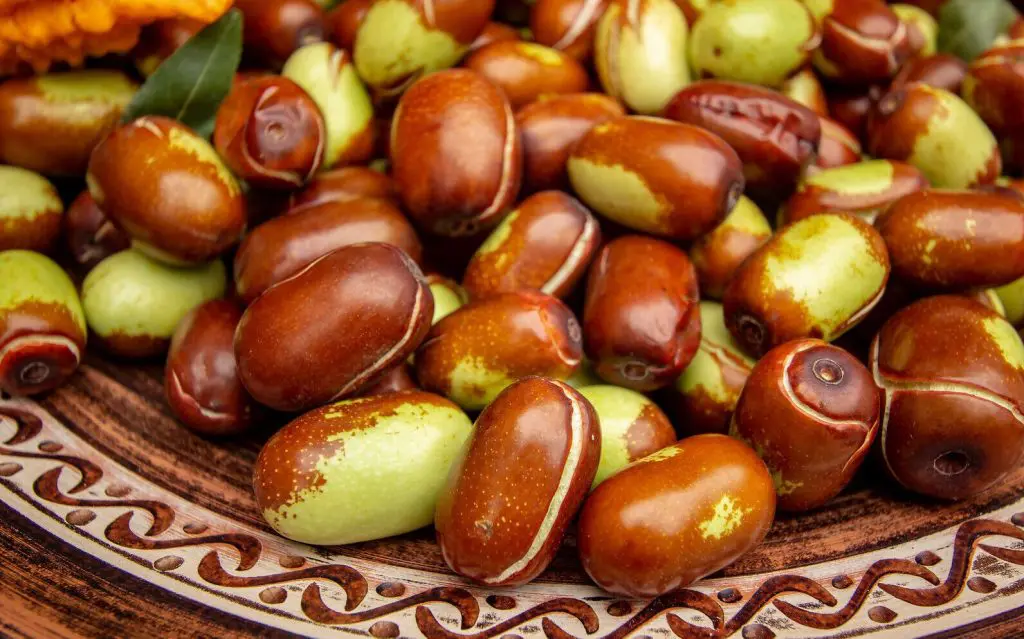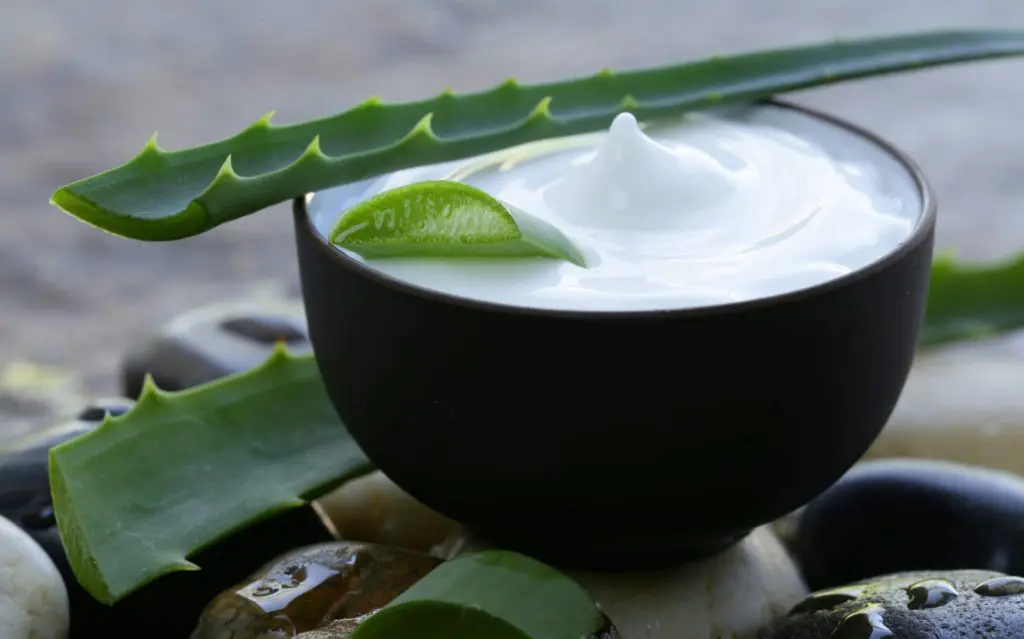Jojoba, scientifically known as Simmondsia chinensis, is a plant that is native to the Sonoran and Mojave Deserts of Arizona, California, and Mexico. The plant produces seeds that contain a natural liquid wax that is commonly referred to as jojoba oil.
In natural skincare, jojoba oil is a popular ingredient due to its numerous benefits, including its ability to moisturize, protect, and soothe the skin. Jojoba oil is also known for its anti-inflammatory and antibacterial properties, making it a suitable choice for oily and acne-prone skin.
In this article, we will explore the properties, functions, features, and benefits of jojoba oil in natural skincare, as well as its different forms and contraindications.
Properties and Functions of Jojoba Oil
Jojoba oil is a liquid wax that is similar in composition to the natural oils found in human skin. This similarity allows jojoba oil to be easily absorbed by the skin without clogging pores or leaving a greasy residue. Jojoba oil is also rich in vitamins E and B-complex, minerals, and fatty acids, making it an excellent moisturizer that can help to soothe and protect the skin.
One of the most notable properties of jojoba oil is its anti-inflammatory and antibacterial effects. This makes it a useful ingredient for people with oily and acne-prone skin. Jojoba oil can help to regulate the production of sebum, the natural oil produced by the skin, which can reduce the likelihood of breakouts. It can also help to soothe and calm irritated skin, reducing redness and inflammation.
Jojoba oil is also a natural antioxidant, which means that it can help to protect the skin from damage caused by free radicals, such as pollution and UV radiation. This can help to prevent premature aging and the development of fine lines and wrinkles.

Features and Benefits of Jojoba Oil in Skincare
Jojoba oil is a versatile ingredient that can be used in a variety of skincare products, including moisturizers, cleansers, and serums.
Here are some of the key benefits of jojoba oil in natural skincare:
Moisturizing:
Jojoba oil is an excellent moisturizer that can help to hydrate the skin without leaving a greasy residue. It can help to soothe dry, cracked, and irritated skin, leaving it soft and supple.
Protecting:
Jojoba oil can help to protect the skin from environmental stressors, such as pollution and UV radiation, which can cause premature aging and damage to the skin.
Regulating:
Jojoba oil can help to regulate the production of sebum, the natural oil produced by the skin, which can reduce the likelihood of breakouts and oily skin.
Soothing:
Jojoba oil has anti-inflammatory and antibacterial properties, which can help to soothe and calm irritated skin, reducing redness and inflammation.
Anti-aging:
Jojoba oil is a natural antioxidant, which means that it can help to prevent premature aging and the development of fine lines and wrinkles.
Remember to always research your ingredients first and check for any contraindications that might mean they are not suitable for you to use. Also, always patch test new ingredients and products and to consult with a skincare professional if you have any concerns or questions about your skincare routine.

The Different Forms of Jojoba Oil used in Natural Skincare
Jojoba oil comes in various forms, including wax, butter, and oil. Here’s a breakdown of each form:
Jojoba Wax:
Jojoba wax is a vegan alternative to beeswax and is commonly used in natural skincare products such as balms, creams, and lotions. Jojoba wax has a high melting point, making it an excellent emollient that can help to lock in moisture.
Jojoba Butter:
Jojoba butter is a solid form of jojoba oil that is commonly used in body butters, lip balms, and other emollient products. Jojoba butter is rich in vitamins and minerals, making it an excellent moisturizer that can help to soothe and protect the skin.
Jojoba Oil:
Jojoba oil is the most common form of jojoba and is used in a wide range of skincare products. Jojoba oil is easily absorbed by the skin, making it an excellent moisturizer that can help to hydrate and soothe dry skin. Jojoba oil can also help to regulate the production of sebum, which makes it an excellent ingredient for people with oily and acne-prone skin.

Suitability of Jojoba Oil for Different Skin Types and Absorption Rate
Jojoba oil is suitable for all skin types, including sensitive skin. It is especially beneficial for people with dry, oily, and acne-prone skin due to its moisturizing and regulating properties. Jojoba oil has a medium absorption rate, which means that it is easily absorbed by the skin without leaving a greasy residue.
Jojoba oil is particularly indicated for oily and acne-prone skin due to its ability to regulate the production of sebum. Sebum is the natural oil produced by the skin, and when it is produced in excess, it can lead to oily skin and breakouts. Jojoba oil can help to regulate the production of sebum, reducing the likelihood of breakouts and oily skin.
We wrote a series of articles about different skin types that might be of interest to you, especially considering Jojoba is suitable for all skin types. You can find an article about dry skin here, oily and acne prone skin here, sensitive skin here and mature or aging skin here.
Types of Products Typically Using Jojoba Oil
Jojoba oil is used in a wide range of skincare products, including:
Balms:
Jojoba oil can be used in balms to help soften and smooth the skin and Jojoba wax can be used as a vegan alternative to beeswax in products such as balms and salves.
Moisturizers:
Jojoba oil is a popular ingredient in moisturizers due to its ability to hydrate and soothe dry skin.
Cleansers:
Jojoba oil is commonly used in oil cleansers due to its ability to dissolve dirt and impurities without stripping the skin of its natural oils.
Oils and Serums:
Jojoba oil is a popular ingredient in oils and serums due to its anti-aging and moisturizing properties.
Lotions and Creams:
Jojoba oil is commonly used in body lotions due to its ability to hydrate and soothe dry skin.
Of course, you can use Jojoba in just about any product that contains oils and oil-soluble ingredients which would include balms, salves, butters, milks, scrubs and more!

Jojoba in Haircare: Benefits and Uses
Jojoba is used in various forms in haircare products, including oil, wax, and butter, but jojoba oil is the most commonly used form in haircare.
Benefits of Jojoba in Haircare
Moisturizes Hair:
Jojoba oil is an excellent moisturizer for hair because it can penetrate the hair shaft and hydrate the hair from the inside out. Jojoba oil helps to prevent dryness and brittleness, making hair more manageable and soft.
Promotes Hair Growth:
Jojoba oil can also promote hair growth by moisturizing the scalp and helping to unclog hair follicles. When hair follicles are blocked, hair growth is slowed down or stopped altogether. Jojoba oil can help to remove buildup on the scalp, allowing for healthy hair growth.
Soothes the Scalp:
Jojoba oil has anti-inflammatory properties that can soothe an itchy or irritated scalp. It can also help to control dandruff by moisturizing the scalp and reducing flakiness.
Adds Shine to Hair:
Jojoba oil is an excellent ingredient for adding shine to hair without leaving a greasy residue. It can be used as a natural alternative to silicone-based shine enhancers.
Uses of Jojoba in Haircare
Conditioner:
Jojoba oil is commonly used in hair conditioners due to its moisturizing properties. It can help to detangle hair, reduce frizz, and leave hair soft and shiny.
Scalp Treatment:
Jojoba oil can be used as a scalp treatment by applying it directly to the scalp and massaging it in. This can help to soothe an itchy or irritated scalp and promote healthy hair growth.
Styling Aid:
Jojoba wax and butter can be used as a natural styling aid for hair. Jojoba wax can be used to provide hold and control for hairstyles, while jojoba butter can be used to moisturize and add shine to hair.
Hair Oil:
Jojoba oil can be used as a hair oil to moisturize and add shine to hair. It can be applied to wet or dry hair and can be left in or rinsed out.

Considerations and Contraindications
While jojoba oil is generally considered safe for most people, there are some considerations and contraindications to keep in mind.
Here we highlight the main ones to consider:
Allergic Reactions:
Some people may be allergic to jojoba oil, so it’s important to do a patch test before using it on your skin.
Purity:
When purchasing jojoba oil, it’s important to ensure that you’re getting a high-quality, pure product. Look for products that are cold-pressed and organic.
Shelf Life:
Jojoba oil has a long shelf life, but it can still go rancid over time. To extend the shelf life of jojoba oil, store it in a cool, dark place.
Irritation:
While jojoba oil is generally well-tolerated by most people, it can cause irritation in some individuals. If you experience any redness, itching, or irritation, discontinue use immediately.
Learn to make your own natural cosmetic products with Jojoba!
Jojoba oil is a versatile and beneficial ingredient in natural skincare. Its moisturizing, protecting, regulating, and soothing properties make it a popular choice for people with a wide range of skin types and concerns.
There are many very good reasons to make your own products and incorporate jojoba oil into them as a key ingredient, as we’ve highlighted in this article. Fortunately, there are many good options available to you and we’re here to help!
Our Certificate in Making Natural Skincare Products is primarily for beginners, home crafters and hobbyists who want to learn to make a range for gorgeous natural & organic skincare products for themselves, family and friends.
Some more advanced formulators enjoy this course because of all the recipes found inside that serve as some inspiration. Inside this course you’ll find over 120+ natural skincare recipes ready for you to use and tips to tweak them to suit your needs and preferences. These recipes have been created by qualified and professional cosmetic experts in line with EU regulations to ensure they conform to the highest regulatory and industry standards.
There are textbooks, video demonstrations, audio files, activities and quizzes, ingredient information and product making tips and guidance. Plus there’s a weekly Tutor Q&A and a peer-to-peer support group where you can collaborate with your fellow students from all around the world. Click here to find out more.
Alternatively, there is our Diploma in Natural Skincare Formulation which teaches students how to create their own complete range of natural skincare products from scratch like the professionals. Essentially, this is the course that enables you to go beyond following other people’s recipes and instead create your own formulations and recipes! The course will set you up for success and enable you to create products either for yourself or to sell and to launch your own brand.

You’ll find an in depth 600+ page textbook on all the ingredients you need. This is the most complete and comprehensive book available covering all of the different types of natural skincare ingredients, all in one place. You can find out more about that textbook here.
In module 4 you’ll learn about the anatomy and physiology of the skin and how to formulate for different types of skin as well as for the skin’s different needs and preferences. We wrote an article that goes into more detail about that module which you can read here.
Inside the course you’ll find a module on natural preservation, a module dedicated to the science of emulsification, modules that teach you how to formulate like a professional, incorporate your values and beliefs into your products whilst complying with cosmetic regulations.
Of course, there are practical modules that you get you doing rather than simply absorbing knowledge! Here you’ll begin formulating your products – oils, butters and balms, soaks, scrubs, mists and toners, creams, emulsions and cleansers and much much more.
And finally, there’s a bonus section at the end that teaches you about formulating natural skincare products with natural surfactants focusing on face and body washes.
If it is haircare you’re interested in, then our Diploma in Natural Haircare Formulation is what you’ll want to join. It is essentially the same as our Diploma in Natural Skincare Formulation but instead of focusing on the skin, we focus on the hair and scalp and what’s required to successfully formulate your own shampoos, conditioners and hair treatment as well as styling products. You can find out more about this course here.




